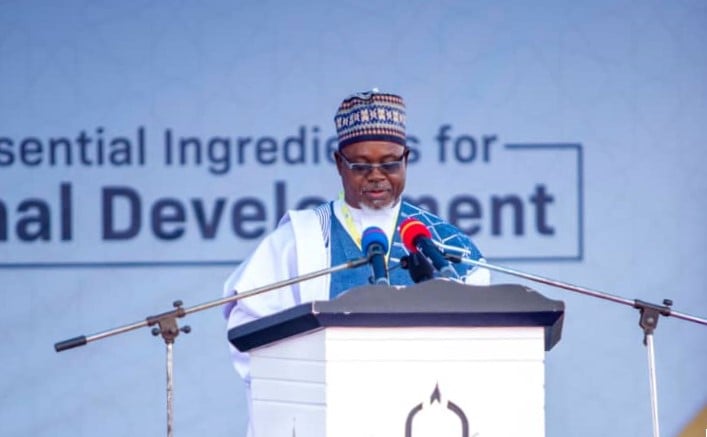Alhaji Maulvi Mohammed Bin Salih, the leader of the Ahmadiyya Muslim Mission in Ghana, delivered a potent message at the Mission’s 92nd National Annual Convention, cautioning the newly elected government led by President John Dramani Mahama against the perils of political and economic nepotism and cronyism. He emphasized that these practices, which prioritize personal relationships and loyalty over merit and fairness, are detrimental to national peace and security, breeding injustice and resentment within society. The convention, held in Gomoa Pomadze and themed “Justice and peace – the essential ingredients for national development,” attracted a massive gathering of over 500,000 attendees, including Ghanaian Ahmadi Muslims, traditional leaders, and high-ranking political figures. This large turnout underscored the significance of the message and the widespread concern regarding these issues within the nation.
Bin Salih’s address highlighted the gravity of nepotism, comparing its destructive potential to that of racism. He argued that both practices undermine the principles of equality and fairness, creating divisions and tensions that can destabilize a nation. He expressed concern over the prevalence of nepotism within Ghana’s governance, suggesting that it had become a systemic issue requiring urgent attention. The Ameer’s direct address to President Mahama served as a public call for accountability and a reminder of the high expectations placed upon the new administration. He pointed to Mahama’s election under challenging circumstances as a testament to the people’s hope for change and a rejection of past injustices.
The Ameer’s words carried a weighty significance, given the context of Mahama’s recent election. The President’s victory came amid a period of political turbulence and uncertainty, suggesting a strong desire among the Ghanaian populace for a leader who would prioritize fairness and justice. Bin Salih emphasized that Mahama’s mandate was rooted in the people’s trust and their expectation that he would address the issues that had undermined previous administrations. He warned against betraying this trust by succumbing to the temptations of nepotism and cronyism, emphasizing that such actions would not only be a disservice to the nation but would also erode the goodwill and support that the President had received.
The theme of the convention, “Justice and peace – the essential ingredients for national development,” provided a framework for understanding the Ameer’s concerns. He argued that true national development cannot be achieved without a foundation of justice and peace. Nepotism and cronyism, by their very nature, undermine these foundational principles. They create an environment of unfairness and inequality, where opportunities are distributed based on personal connections rather than merit, leading to resentment, disillusionment, and ultimately, instability. Conversely, a just and peaceful society fosters trust, cooperation, and a sense of shared purpose, creating an environment conducive to progress and development.
The Ameer’s message was not merely a critique of the government but a call for a broader societal transformation. He urged all Ghanaians, regardless of their political affiliations or social standing, to reject the temptations of nepotism and cronyism in their own lives and to uphold the principles of fairness and justice in all their dealings. This call for individual responsibility reflected the Ahmadiyya Muslim Mission’s commitment to promoting ethical values and good governance within Ghanaian society. The convention itself served as a platform for disseminating these values and fostering dialogue on issues of national importance.
The presence of such a large and diverse audience at the convention underscored the resonance of the Ameer’s message. The attendance of traditional leaders and high-ranking political figures, in addition to the Ahmadi Muslim community, signaled a broad recognition of the importance of addressing nepotism and cronyism. This convergence of diverse stakeholders suggested a collective desire for positive change and a willingness to work towards a more just and peaceful society. The Ameer’s words served as a powerful reminder of the shared responsibility to uphold these values and to build a nation where all citizens have equal opportunities to thrive.


